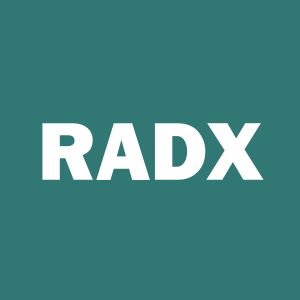Welcome to our dedicated page for Radiopharm Theranostics news (Ticker: RADX), a resource for investors and traders seeking the latest updates and insights on Radiopharm Theranostics stock.
Radiopharm Theranostics Ltd (RADX) is an Australian clinical-stage biopharmaceutical company pioneering targeted radiopharmaceuticals for cancer diagnosis and therapy. This page provides investors and researchers with essential updates on RADX's oncology innovations, including clinical trial progress, strategic collaborations, and regulatory milestones.
Access real-time news about RADX's pipeline developments, including novel agents like 177Lu-RAD202 for HER2-positive cancers and RAD 101 for brain metastasis imaging. Stay informed on partnerships accelerating radiopharmaceutical research and ASX/Nasdaq-listed financial updates.
Key content includes trial phase results, FDA/EMA regulatory filings, licensing agreements, and scientific presentations. All updates are vetted for accuracy and relevance to RADX's mission of advancing precision oncology through theranostics.
Bookmark this page for streamlined access to RADX's latest advancements in radiopharmaceutical science. Check regularly for authoritative updates on clinical developments directly impacting oncology care innovation.
Radiopharm Theranostics (NASDAQ: RADX) increased its ownership in Radiopharm Ventures, LLC (a joint venture with MD Anderson) from 75% to 87.5% as the JV advances its oncology radiopharmaceutical pipeline. The lead candidate, Betabart (RV01), a 177Lu-labelled monoclonal antibody targeting B7H3, received FDA IND clearance in July 2025 and is expected to dose its first patient in a Phase I therapeutic study in Q1 2026. Two additional preclinical assets reported early positive results and are moving toward final candidate selection in 2026. The JV combines MD Anderson’s antigen discovery and imaging expertise with Radiopharm’s therapeutic development capabilities.
Radiopharm Theranostics (ASX:RADX) reported interim Phase 2b imaging results for RAD 101 in brain metastases showing 92% concordance (11/12 patients) with MRI and selective tumor uptake on PET imaging.
The company noted 50% trial enrollment, U.S. FDA Fast Track designation for RAD 101, and cited an independent U.S. market opportunity estimate of $500M+ annually. Management plans a webinar on Dec 15–16, 2025 and stated a goal to start a pivotal study by end of 2026.
Radiopharm Theranostics (ASX:RADX) received Bellberry Human Research Ethics Committee approval on November 18, 2025 to start a First‑In‑Human Phase 1 trial of RAD 402, an anti‑KLK3 monoclonal antibody radiolabelled with 161Tb for metastatic or locally advanced prostate cancer.
Preclinical biodistribution in mouse xenografts showed strong tumour targeting, limited bone and marrow uptake, and hepatic excretion. Radiopharm has supply agreements with Terthera (2022) for 161Tb production and Cyclotek (2025) for radiolabelling RAD 402, supporting trial initiation.
Radiopharm Theranostics (ASX:RADX) announced that its Phase 2b trial of RAD101 for imaging brain metastases has reached 50% patient enrollment and is expected to complete enrollment with topline data in 1H 2026. Early data from the first three patients showed significant, selective tumor uptake in brain metastases with metabolic activity visible where MRI was equivocal. RAD101 targets fatty acid synthase (FASN) and has U.S. FDA Fast Track designation to help distinguish recurrence from treatment effect. If Phase 2b findings are confirmed, the company plans to prepare a multi-center global Phase 3 registrational trial.
Key factual points:
- 50% enrollment achieved (Phase 2b)
- Topline data anticipated in 1H 2026
- Early 3-patient imaging showed selective uptake versus equivocal MRI
- RAD101 holds FDA Fast Track designation
Radiopharm Theranostics (NASDAQ: RADX) announced on Nov 12, 2025 that enrollment of the second cohort is complete in the open-label Phase 0/1 trial of 177Lu-RAD204 in PD-L1 positive advanced cancers.
The Data Safety Monitoring Committee approved escalation to a higher dose of 90 mCi for the Third Cohort. The first two cohorts showed tumor uptake and a favourable safety profile. The basket trial includes NSCLC, SCLC, TNBC, cutaneous melanoma, HNSCC and endometrial cancer and will continue to collect safety, biodistribution, dosimetry and preliminary anti-tumour data.
Radiopharm Theranostics (NASDAQ: RADX) reported positive early clinical data across four radiopharmaceutical programs and outlined near-term milestones through 2025–2026. Key updates: RAD 101 Phase 2b (n=30) has enrolled 12 patients with uptake seen in first three brain metastasis patients; topline Phase 2 expected H1 2026 and enrollment completion targeted Q1 2026. RAD 202 Phase 1 HEAT trial advanced to 75mCi after favorable DSMC review; cohort data from first three patients show significant HER2 tumor uptake with no drug-related adverse events; cohort 2 data expected by year-end 2025. RAD 204 Phase 1 showed tumor uptake and 2/3 patients with 5.5-month stable disease at 30mCi; dose escalation under DSMC review. RAD 301 Phase 1 imaging in PDAC (6/9 dosed) supported move to Phase 2 loco-regional study.
Radiopharm Theranostics (ASX:RAD; Nasdaq:RADX) completed a A$35.0 million institutional placement at A$0.03 per share and launched a A$5.0 million Share Purchase Plan at the same price for eligible Australian and New Zealand shareholders on 20 October 2025.
Participants in both offers will receive one free attaching option per new share (exercise A$0.039; expiry 31 October 2027) subject to shareholder approval. Strategic investor Lantheus invested A$7.6 million in the placement, increasing its holding to 14.5%. Proceeds plus existing cash (A$19m at 30 Sep 2025) are earmarked: A$6m drug manufacturing, A$34m clinical trials, and A$19m administration/working capital, extending funding into 2027.
Radiopharm Theranostics (NASDAQ: RADX) received a positive recommendation from the Data Safety and Monitoring Committee (DSMC) to advance its Phase 1 'HEAT' clinical trial of 177Lu-RAD202 to a higher dose level. The trial, targeting HER2-positive advanced solid tumors, will progress to 75mCi dosing, skipping the planned 40mCi level after successful completion of the first 30mCi cohort.
The DSMC's review confirmed positive safety, pharmacokinetic, and biodistribution data from the initial cohort. The company expects to enroll the second cohort by Q4 2025 and remains on track to share data from the first two cohorts by year-end 2025. The study is being conducted across clinical centers in Australia.
Radiopharm Theranostics (NASDAQ: RADX), a clinical-stage biopharmaceutical company, reported significant progress across its radiopharmaceutical pipeline for FY2025. Key developments include FDA Fast Track Designation for RAD101 for brain metastases treatment differentiation, positive DSMC recommendation for RAD204 dose escalation to 60mCi, and advancement in the Phase 1 'HEAT' trial of RAD202 for HER2-positive tumors.
The company maintains a strong financial position with cash balance of $29.12 million, up from $18.58 million year-over-year, providing runway through mid-2026. Notable achievements include IND clearance for RV-01, strategic supply agreements with ITM and Cyclotek for radioisotopes, and progression across multiple clinical trials with data readouts expected in H2 2025.
Radiopharm Theranostics (NASDAQ:RADX) has received FDA clearance for its Investigational New Drug (IND) application for Betabart (RV-01), a Lu177-B7H3 monoclonal antibody targeting aggressive solid tumors. The company plans to initiate its first-in-human Phase 1 clinical trial in Q4 2025.
RV-01, developed through a joint venture with MD Anderson Cancer Center, is designed with high affinity for the 4Ig isoform of B7H3, which is highly expressed in tumors but not in healthy tissues. The drug's hepatic clearance pathway and shortened half-life may offer advantages over other radiotherapeutics, potentially minimizing hematological toxicities and kidney-related side effects.


